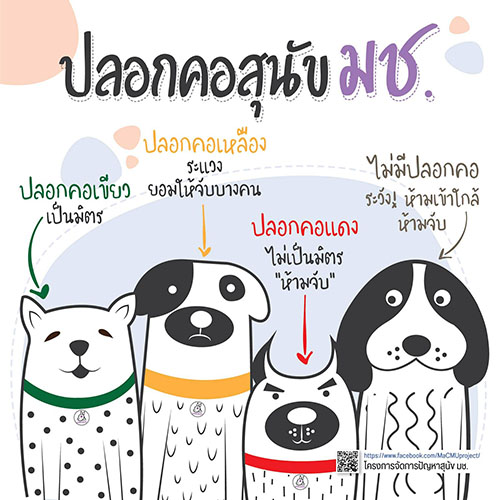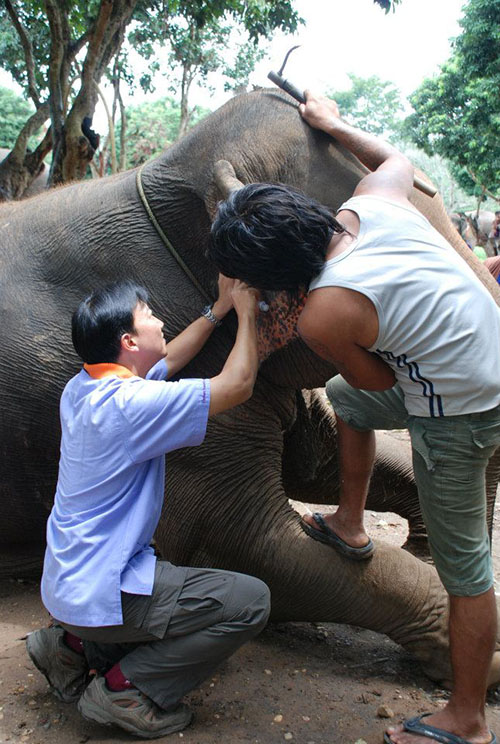Doi Kham Animal Health Centre
Chiang Mai University has a reputation nationwide as a Dog Friendly University, one justly deserved. Due to the success of the MaCMU Project what was once a number of street dogs have been sustainably managed and could turn on campus into "Community Dogs”. Pet lovers across Thailand look to Chiang Mai University as a beacon of success in terms of community dog management.
Today there are over 200 community dogs living on the campuses of the university, all are under the supervision and care of University Personnel/Volunteers/students. Each dog obtains all necessary health checks, vaccination and sterilization from MaCMU project by the Small Animal Hospital, behavior training, meticulous medical recording, and dog microchip implanting to confirm the identity and protect loss of dogs. This entire system has been implemented systematically by CMU Faculty of Veterinary Medicine collaborating with other faculties and the Office of the University that contributes both knowledge and empathy to those defenseless dogs and lead to the achievement of sustainable results which is now seen as a model for community management of stray dogs which can be replicated across the nation.
MaCMU Project

Adorable dogs under the care of MaCMU Project
Information on Chiang Mai University’s community dogs
Chiang Mai University Run for Animal Health
At CMU, Dog Friendly University, Faculty of Veterinary Medicine is not limited only to lead as head of the MaCMU Project but also to contribute knowledge in veterinary and draw up community collaboration to serve the society concerning animals in many area projects. For instance, the famous Centre of Elephant and Wildlife Research is renowned worldwide for its elephant care, Food Safety CMU Project and recently, the PODD Centre has received both national and international awards and recognition for its efforts in monitoring and controlling the spread of diseases from animals to humans, and the Food Safety CMU project is the collaborative project among several faculties to contribute academic services on quality and safety of food in the University which aims to build a good health of University’s people. Recently, the new Doi Kham Animal Health Centre, Faculty of Veterinary Medicine, Chiang Mai University will be the centre for providing specialized treatment services for pets and create veterinary specialists to address animal health problems across the north of Thailand and society. Especially in the current situation where there is a risk of epidemics from animals to humans, it reinforces how important veterinary knowledge is in this modern world.

The workings of the Centre of Elephant and Wildlife Research
Participatory One-Health Disease Detection (PODD) Centre for prevention of animal diseases spreading to humans
Food Safety CMU Project
Faculty of Veterinary Medicine, Chiang Mai University
Vets Learning from Problem
The Faculty of Veterinary Medicine has been producing graduates for 27 years now. Whether researchers or educators, the faculty’s graduates are instilled with a sense of purpose, working for the public good across the northern region. With an emphasis on “Problem Based-Learning”(PBL), students of the faculty are taught to learn from real life experiences and challenges, taking those issues on board, studying them and finding solutions.
Assistant Professor Dr. Khwanchai Kreausukon, Dean, Faculty of Veterinary Medicine Chiang Mai University
The Faculty of Veterinary Medicine currently runs three animal hospitals: The Small Animal Hospital which cares for small pets, Mae On Hospital in Mae On District of Chiang Mai which looks after livestock animals and pets, and lastly, the Large Animal Hospital which offers advice on healthcare as well as medical service in horses. Besides offering problem based learning study, Faculty of Veterinary Medicine instills a sense of social responsibility in all of its students, teaches them life skills alongside career skills so that they can work effectively, as a team, to solve any problems and challenges faced. Because diseases are more than ever spreading from animals to humans, the purview of the Faculty has been addressed broader to meet today’s needs, as explained by Assistant Professor Dr. Khwanchai Kreausukon, Dean of Faculty of Veterinary Medicine, Chiang Mai University.
Doi Kham Animal Health Centre
Centre of Excellence in Animal Health
The Doi Kham Animal Health Centre is a four-story building and located in area of CMU Research and Demonstration Center in Mae Hia Sub-district of Chiang Mai and in offering a myriad of animal health services:
1. The Veterinary Centre of Excellence to increase the efficiency of animal health cares, for example, there is research and development in vaccines for animals, flea and tick vaccines.Moreover, there is collaboration between Materials Science Research Centre (MSRC) and Faculty of Veterinary Medicine, Chiang Mai University to develop medical equipment to substitute for imports and ready to be a learning center for students to gain professional knowledge and expertise in veterinary, serve the production of veterinary specialists (Residency Program).
2. The Northern Veterinary Specialist & Referral Center to be a regional referral centre for complex specialized treatments from network veterinary hospitals. To date, Chiang Mai University’s Faculty of Veterinary Medicine has 14 specialty clinics namely; Dermatology Clinic, Ophthalmology Clinic, Dental Clinic, Orthopedic Clinic, Cardiology Clinic, Neurology Clinic, Feline Clinic, Oncology Clinic, Endocrinology Clinic, Nephrology Clinic, Reproductive Clinic, Acupuncture Clinic, Exotic Clinic, and Aquatic Clinic.
3. The Veterinary Diagnostic Laboratory and Technology Transfer is a streamlined unit designed for academic services and animal disease diagnosis with rapid and accuracy results to react to any threat of animal diseases and lead to effective animal disease treatment, surveillance control and prevention.
4. Food Safety and Zoonoses Centre to offer a variety of extension services and laboratory services related to quality and safety of foods from animal origins along the food production chain: from farms to consumers such as detection of food hygiene and food safety of animal feeds, raw materials such as meats, milk, eggs, fishes, seafoods, additives in the production, contaminants and adulteration, and serves as an academic services for good practice and standard in food safety and hygienic production in foods from animal origins. Besides, the center is opened for academic services on epidemiology, disease surveillance and control/prevention of zoonotic diseases, including animal pandemic diseases and transboundary animal diseases which have impact to international trade and economics.
Besides offering services to public, the Doi Kham Animal Health Centre also acts as a learning centre for students to develop a variety of skills and create veterinary personnel with specific expertise by offering internship programmes, residency programmes, diploma certificate programme, and veterinary nursing programme to meet the needs of farmers and people as said on this issue by Dean Khwanchai Kreausukon.
“With a recent question, there is a need asking us to produce veterinary specialist such as cardiology specialists because of the long life of pets and heart disease is a common disease found in these senior pets. At these concerns, we will offer a residency program to create veterinary specialists. Therefore, the beneficiary of this Doi Kham Animal Health Centre will be, first, pet owners will obtain the special clinics to service and take care of their beloved pets efficiently and appropriately and lead the pets to live longer. Second, pet owners who live in the remote areas will be able to access animal health care services near their house from veterinary specialists that will graduate from our residency programme soon, instead of having to drive and bring their pets to obtain treatment with us here. This will result in having veterinary specialist resources across the upper northern region that are able to provide the specific treatments and health care in animals like having human doctor specialists in provincial hospitals.
On the other hand, we certainly should not leave the livestock farmers because the Veterinary Diagnostic Laboratory and Technology Transfer is right here to support them. We have to develop vaccines and test kits, otherwise, when an epidemic occurs, we have not to rely on vaccines from overseas.
And recently, we have the knowledge to make innovative vaccines for veterinary use (Autogenous vaccine), namely, the production of vaccines prepared from the virus or bacteria that cause the epidemic and bring it back to use in those specific farms to solve the existing epidemic problems including a rapid diagnosis will able to advice livestock farmers how to control and prevent.”
Doi Kham Animal Health Centre will open within 2022 that will offer a comprehensive treatment and animal health care with its 14 specialty clinics and various departments such as surgery clinic, emergency clinic, critical care clinic etc. There will also be a rehabilitation centre on site including an indoor swimming pool for physiotherapy, animal wards for dogs, cats, special pets and any other sick animals in need. All this to make the Doi Kham Animal Health Center a source of knowledge and love (nurture) that is able to apply the existing bodies of knowledge to sustain the animal health care and so that the veterinary profession can be truly reliable to the society.